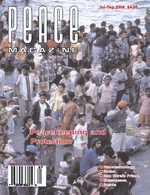
Peace Magazine Jul-Sep 2004, page 25. Some rights reserved.
Search for other articles by John Bacher here
Powerful figures have conspired against the creation of a functioning central government, but regional diplomacy may lead to agreement
One of the darkest days in the post-Cold War quest for a democratic international order under the rule of law took place in the January 1994, when United Nations peacekeeping forces were withdrawn from Somalia. This was done in response to a much reported street battle in the capital of Mogadishu.
The failure of the UN in Somalia was particularily tragic since it encouraged the world to ignore humanitarian disasters. Thus only three months after the pullout, the Somalia fiasco became the biggest excuse for the United States to ignore the warnings of Canadian General Romeo Dallaire about the pending genocide in Rwanda.
For over 10 years Somalia has been without a central government, but now a ceasefire agreement and continued peace talks have been the cause for new hope for the country. To succeed, however, these efforts need help from Canada and other states in the global democratic community of nations.
Somalia today is effectively divided into three parts. The one most successfully operating like a state under the rule of law is Somaliland, the northern part of the country, which was once a British colony. It has declared itself independent, but has not been recognized by any country. The greatest problem with gang violence is in the southernmost third of the country. It is the most heavily populated and the least governed by structures of accountability comparable to a state.
The rule of law is almost non-existent in southern Somalia. Women are generally afraid to walk around alone because of the dangers of kidnapping. Foreigners are advised to have a military type of escort from the Mogadishu airport to their hotel. Although the long, sweeping street battles of the early 1990s are over, fighting continues within clans. While these battles have become localized conflicts between subclans and are shorter and less lethal than in the past, they are still dangerous.
Powerful figures in Somalia have conspired against the creation of a functioning central government. Some businessmen in the country believe they benefit from the absence of taxation. Similar attitudes are held by powerful criminals, many of whom would face arrest for serious offences, such as crimes against humanity, if a government were able to function. Other business, especially the owners of seaports, have expressed fears of government expropriation.
To the formidable internal barriers to state formation are added the uncooperative attitude of the government of Ethopia. It fears that the emergence of a united Somalia might encourage a renewal of an old border dispute, which in the past resulted in a major war between the two states.
A major sign of hope for Somalia took place in October 2002 with the start of a peace conference, which is still continuing. Unlike most other peace conferences since the state's collapse in 1991, this one involved the participation of all militia leaders. To garner more international support for an agreement, Kenya entered into negotiations with Ethopia, Djibouti and Eritrea. A critical advance in the conference was the signing of a ceasefire agreement on October 27, 2002.
Although the ceasefire has had a positive impact, the peace conference has had a rocky road. For over a year after the ceasefire agreement, the conference was bogged down in arguments about formalistic conference proceedings. These delayed discussions about substantive issues such as power-sharing, a constitutional structure, economic recovery, and transitional justice. The talks appeared to be on the verge of collapse.
In January 2004, the peace talks moved from Eldoret in northern Kenya to the capital Nairobi. Persistence appeared to pay off when on January 29, 2004, a parliamentary framework agreement was created. It declared that a selection of clan elders would be summoned to Nairobi to choose a parliament, which would elect a president.
Unfortunately, the euphoria over the apparent conference success lasted only two days. Soon several signers of the farmework rejected it, saying that the document they had signed was different from that which they saw during their deliberations. It became difficult to resolve these conflicts, since rather than dealing with substantial issues, the delegates began to dispute who was entitled to take part in their meetings.
To help Somalia, the United States Institute for Peace on Februrary 11, 2004 convened a meeting of a panel of experts. This organization has an impressive record of bringing together diverse parties to seek peaceful solutions based on the rule of law, nonviolence, democracy, and human rights.
The results of the conference were published by the US Institute for Peace. It made the following recommendations.
Canada should take measures to encourage the practical steps toward peace in Somalia outlined by the US Institute for Peace.
Canadians were generally enthusiastic when former Prime Minister Jean Chrétien pointed out to US President George Bush that the problem of failed states such as Somalia had much to do with the disaster of terrorism experienced on September 11th. If such remarks are not simply to be nationalist rhetoric, Canadians need to follow through with practical efforts through aid and diplomacy to help bring a democratic order to one of the poorest corners of the world.

Peace Magazine Jul-Sep 2004, page 25. Some rights reserved.
Search for other articles by John Bacher here